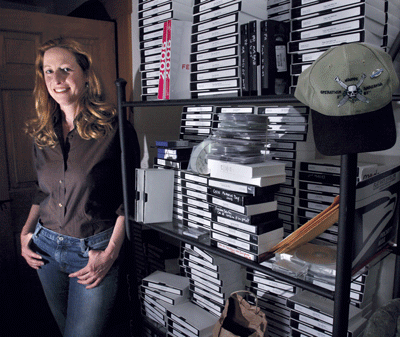BAM Your last film was a short documentary about World War II veterans. How did that lead to a feature movie about Iraq?

Deborah Scranton Five months after I made that film, my phone rang with an offer from the New Hampshire National Guard to be a filmmaker in any of the units being deployed to Iraq. And literally that night I woke up in the middle of the night, wide awake as can be, with the idea to give the soldiers the cameras instead—in effect, to virtually embed.
BAM How did you implement the idea?
DS The next morning I called [the public relations officer] back and told him the concept. [Shortly after] they said yes. There was a caveat, though: I had to get the guys to volunteer. So a few days later I flew down to Fort Dix, hopped out in front of the whole unit—180 guys—and told them my vision. I made them a promise. I gave them my word that we would tell their story through their eyes, no matter what.
BAM Ten men volunteered. What equipment did you give them?
DS Each was given a one-chip Sony
mini-DV camera, tripod, microphones, various lenses, piles of blank
tapes, and my instant message handle and e-mail.
BAM How about training?
DS These are consumer cameras. You press Record. Soldiers in general are very mechanically adept. I joked when I gave the cameras out. I said “Okay, you guys can’t leave the room until you shoot film and show it to me.” They broke down the kits, and within five minutes they’d rolled tape and were showing it.
BAM You were in New Hampshire, and for most of the time the men were in Iraq. How did that work?
DS The film isn’t about the Internet, but it could never have been made without it. The Web allowed us to talk, to work together to decide how best to tell the story. The soldiers were ingenious in mounting the cameras on the dashboards of the Humvees, on the gun turrets, on their Kevlar [helmets]. And then they were so dedicated to either doing self-interviews or interviewing each other within twenty-four hours [of combat]. In the military that’s called a hot wash; it’s while the experience is still fresh in your mind.
BAM Then you interviewed them when they were on leave and after they came home.
DS So what you see and hear in the film is this multiplicity of context—this interplay of history and memory and perception—hey, I’m a semiotics major, what can I say?





